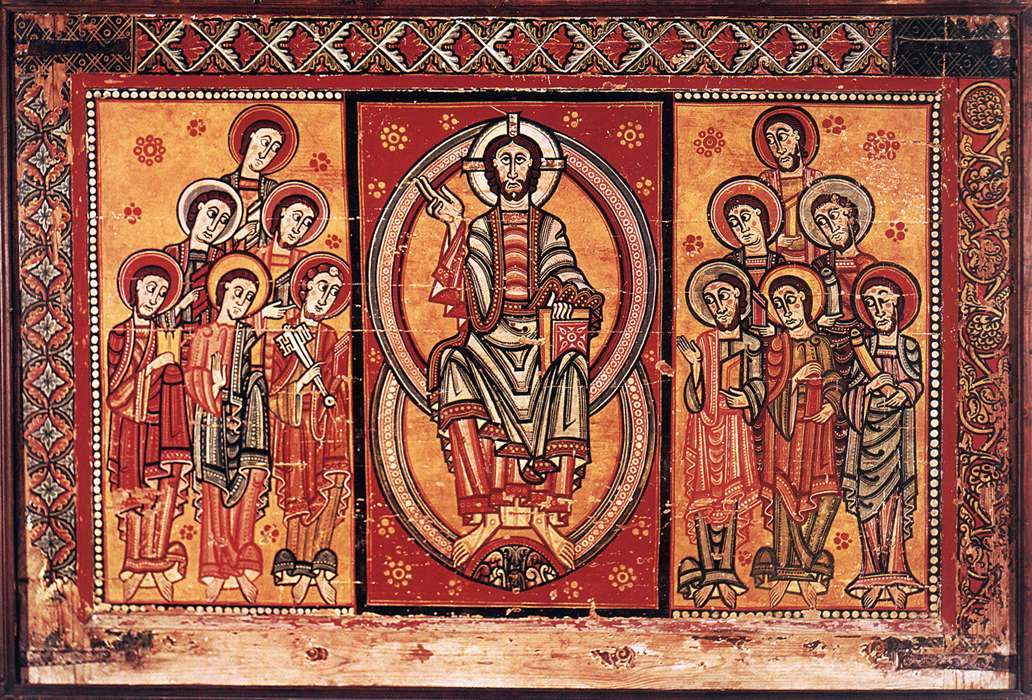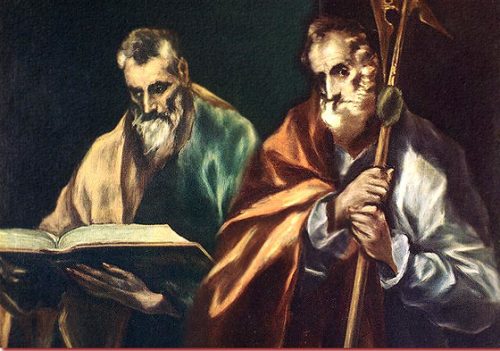
Catena Aurea by St. Thomas Aguinas
6:12–16
12. And it came to pass in those days, that he went out into a mountain to pray, and continued all night in prayer to God.
13. And when it was day, he called unto him his disciples: and of them he chose twelve, whom also he named apostles;
14. Simon, (whom he also named Peter,) and Andrew his brother, James and John, Philip and Bartholomew,
15. Matthew and Thomas, James the son of Alphæus, and Simon called Zelotes,
16. And Judas the brother of James, and Judas Iscariot, which also was the traitor.
GLOSS. (non occ.) When adversaries rose up against the miracles and teaching of Christ, He chose Apostles as defenders and witnesses of the truth, and prefaces their election with prayer; as it is said, And it came to pass, &c.
AMBROSE. Let not thy ears be open to deceit, that thou shouldest think that the Son of God prays from want of strength, that He may obtain what He could not perform; for being Himself the Author of power, the Master of obedience, He leads us by His own example to the precepts of virtue.
CYRIL OF ALEXANDRIA. Let us examine then in the actions which Jesus did, how He teaches us to be instant in prayer to God, going apart by ourselves, and in secret, no one seeing us; putting aside also our worldly cares, that the mind may be raised up to the height of divine contemplation; and this we have marked in the fact, that Jesus went in to a mountain apart to pray.
AMBROSE. Every where also He prays alone, for human wishes comprehend not the wisdom of God; and no one can be a partaker of the secrets of Christ. But not every one who prays ascends a mountain, he only who prays advancing from earthly things to higher, who is not anxious for the riches or honours of the world. All whose minds are raised above the world ascend the mountain. In the Gospel therefore you will find, that the disciples alone ascend the mountain with the Lord. But thou, O Christian, hast now the character given, the form prescribed which thou shouldest imitate; as it follows, And he continued all night in prayer to God. For what oughtest thou to do for thy salvation, when Christ continues all night in prayer for thee?
CHRYSOSTOM. (Hom. ad Pop. Ant. 42. et in Act. c. 16. Ed. Lat.) Rise then thou also at night time. The soul is then purer, the very darkness and great silence are in themselves enough to lead us to sorrow for our sins. But if thou lookest upon the heaven itself studded with stars as with unnumbered eyes, if thou thinkest that they who wanton and do unjustly in day time are then nothing different from the dead, thou wilt loathe all human undertakings. All these things serve to raise the mind. Vain-glory then disquiets not, no tumult of passion has the mastery; fire does not so destroy the rust of iron as nightly prayer the blight of sin. He whom the heat of the sun has fevered by day is refreshed by the dew; nightly tears are better than any dew, and are proof against desire and fear. But if a man is not cherished by the dew we speak of, he withers in the day. Wherefore although thou prayest not much at night, pray once with watching, and it is enough; shew that the night belongs not only to the body, but to the soul.
AMBROSE. But what does it become thee to do when thou wouldest commence any work of piety, when Christ, about to send out His disciples, first prayed? for it follows, And when it was day, he called his disciples, &c. whom truly He destined to be the means of spreading the salvation of man through the world. Turn thy eyes also to the heavenly council. Not the wise men, not the rich, not the noble, but He chose to send out fishermen and publicans, that they might not seem to turn men to their grace by riches or by the influence of power and rank, and that the force of truth, not the graces of oratory, might prevail.
CYRIL OF ALEXANDRIA. (ut sup.) But mark the great carefulness of the Evangelist. He not only says that the holy Apostles were chosen, but he enumerates them by name, that no one should dare to insert any others in the catalogue; Simon, whom he also called Peter, and Andrew his brother.
BEDE. He not only surnamed Peter first, but long before this, when he was brought by Andrew, it is said, Thou shall be called Cephas, which is by interpretation, a stone (John 1:42.). But Luke, wishing to mention the names of the disciples, since it was necessary to call him Peter, wished shortly to imply that this was not his name before, but the Lord had given it to him.
EUSEBIUS. The two next are James and John, as it follows, James and John, both indeed sons of Zebedee, who were also fishermen. After them he mentions Philip and Bartholomew. John says Philip was of Bethsaida, of the city of Andrew and Peter. Bartholomew was a simple man, devoid of all worldly knowledge and guile. But Matthew was called from those who used to collect taxes; concerning whom he adds Matthew and Thomas.
BEDE. Matthew places himself after his fellow-disciple Thomas, from humility, whereas by the other Evangelists he is put before him. It follows, James the son of Alphæus, and Simon who is called Zelotes.
GLOSS. Because in truth he was of Cana in Galilee, which is interpreted zeal; and this is added to distinguish him from Simon Peter. It follows, Judas the brother of James, and Judas Iscariot, who also betrayed him.
AUGUSTINE. (de Con. Ev. lib. ii. c. 30.) With respect to the name of Judas the brother of James, Luke seems to differ from Matthew, who calls him Thaddæus. But what prevented a man from being called by two or three names? Judas the traitor is chosen, not unwittingly but knowingly, for Christ had indeed taken to Himself the weakness of man, and therefore refused not even this share of human infirmity. He was willing to be betrayed by His own Apostle, that thou when betrayed by thy friend mayest bear calmly thy mistaken judgment, thy kindness thrown away.
BEDE. But in a mystical sense the mountain on which our Lord chose His disciples represents the loftiness of justice in which they were to be instructed, and which they were to preach to others; so also the law was given on a mountain.
CYRIL OF ALEXANDRIA. But if we may learn the interpretation of the Apostles’ names, know that Peter means, “loosening or knowing;” Andrew, “glorious power,” or “answering;” but James, “apostle of grief;” John, “the grace of the Lord;” Matthew, “given;” Philip, “large mouth,” or the “orifice of a torch;” Bartholomew, “the son of him who lets down water;” Thomas, “deep or twin;” James the son of Alphæus, “supplanter of the step of life;” Judas, “confession;” Simon, “obedience.”
6:17–19
17. And he came down with them, and stood in the plain, and the company of his disciples, and a great multitude of people out of all Judæa, and Jerusalem, and from the sea coast of Tyre and Sidon, which came to hear him, and to be healed of their diseases;
18. And they that were vexed with unclean spirits: and they were healed.
19. And the whole multitude sought to touch him: for there went virtue out of him, and healed them all.
CYRIL OF ALEXANDRIA. When the ordination of the Apostles was accomplished, and great numbers were collected together from the country of Judæa, and from the sea coast of Tyre and Sidon, (who were idolaters,) he gave the Apostles their commission to be the teachers of the whole world, that they might recal the Jews from the bondage of the law, but the worshippers of devils from their Gentile errors to the knowledge of the truth. Hence it is said, And he came down with them, and stood in the plain, and a great multitude from Judæa, and the sea coast, &c.
BEDE. By the sea coast he does not refer to the neighbouring sea of Galilee, because this would not be accounted wonderful, but it is so called from the great sea, and therein also Tyre and Sidon may be comprehended, of which it follows, Both of Tyre and Sidon. And these states being Gentile, are purposely named here, to indicate how great was the fame and power of the Saviour which had brought even the citizens of the coast to receive His healing and teaching. Hence it follows, Which came to hear him.
THEOPHYLACT. That is, for the cure of their souls; and that they might be healed of their diseases, that is, for the cure of their bodies.
CYRIL OF ALEXANDRIA. But after that the High Priest had made publicly known His choice of Apostles, He did many and great miracles, that the Jews and Gentiles who had assembled might know that these were invested by Christ with the dignity of the Apostleship, and that He Himself was not as another man, but rather was God, as being the Incarnate Word. Hence it follows, And the whole multitude sought to touch him, for there went virtue out of him. For Christ did not receive virtue from others, but since he was by nature God, sending out His own virtue upon the sick, He healed them all.
AMBROSE. But observe all things carefully, how He both ascends with His Apostles and descends to the multitude; for how could the multitude see Christ but in a lowly place. It follows him not to the lofty places, it ascends not the heights. Lastly, when He descends, He finds the sick, for in the high places there can be no sick.
BEDE. You will scarcely find any where that the multitudes follow our Lord to the higher places, or that a sick person is healed on a mountain; but having quenched the fever of lust and lit the torch of knowledge, each man approaches by degrees to the height of the virtues. But the multitudes which were able to touch the Lord are healed by the virtue of that touch, as formerly the leper is cleansed when our Lord touched him. The touch of the Saviour then is the work of salvation, whom to touch is to believe on Him, to be touched is to be healed by His precious gifts.
Catena Aurea Luke 6






